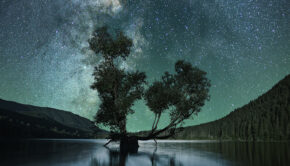The Ecology of Relationship
On a recent Shabbat I was leading a synagogue Torah study discussion centering on why people don’t seem to respond to warnings. From the prophet Isaiah warning the people to reform their ways, to do justice and not violence, lest they risk destruction of their homeland, to the clear signs of global warming today, droughts and heat waves, we don’t seem to be able to change our ways, react to warning signs in time to avert disaster. As we were finishing up the discussion, suddenly, one of the congregants began showing signs that a serious medical emergency was occurring. We stopped and gave this person assistance. Someone called 911 and the fire department came. Someone accompanied her to the hospital, and later people made sure that this person had transportation home from the hospital. It was heartening to see people respond quickly, willingly and efficiently to the clear need of a member of our community.
Looking back on it, the way that we all responded was praiseworthy, but was not much different than I expect any true community, any responsible group of people, would respond to an emergency that is occurring in front of their eyes.
And, it made me think about the discussion that we were having earlier: Abstract warnings are no substitute for immediate feedback. We thrive on the real, tangible feedback that comes with being in relationship with each other. And yet, today, we often find ourselves isolated, even with all our technology and creature comforts (maybe because of all our technology and creature comforts), from a feeling of community.
In the next few weeks we’ll be reading in the book of Deuteronomy, the last book of the Torah. There is a passage in Deuteronomy which you could easily miss, but I think it holds one of the keys to understanding the whole Torah, and to this question of warnings, relationships and community. The passage is in Deuteronomy 11:9–12 and goes like this:
For the land that you are about to enter and possess is not like the land of Egypt from which you have come. There the grain you sowed was watered with your feet, like a vegetable garden. But the land you are about to cross over into and possess, a land of hills and valleys, drinks up the water from the rain of heaven. It is a land which the Lord your God looks after, on which the Lord your God always keeps His eye, from years beginning to year’s end.
This passage hints at one of the great divides in the economy and ecology of the biblical world: between the land of Canaan, with its hill and valley, small farming ecology based on rainfall, and the mega civilizations to their East and West: Egypt and Mesopotamia. These ancient world powers were economically based on river or canal irrigation (“the grain you sowed was watered with your feet” refers to irrigation, i.e., they needed to look down at their feet, to the irrigation canals, as opposed to up towards heaven, the source of the rainfall). In the biblical mind these were the corrupt, evil societies: Egypt is the prime example, with its slavery, cruel decrees against Israelite newborns, and their general preference for bricks and mortar over people; the Eastern Mesopotamian cultures are represented by the story of the Tower of Babel, which portrays a culture that rivaled Egypt in its obsession with bricks and mortar over people while arrogantly striving to challenge God with its magnificent tower, and, closer to home, the Jordan river valley cities of Sodom and Gomorrah, which are portrayed as similar to Egypt – wealthy, but corrupt and fanatically rejecting any hospitality to strangers. We see running through the Torah an equation of wealthy river valley cultures and corruption, arrogance and an obsession with totalitarian control.
What the Torah is hinting at here is that these world powers with their irrigation economies could live in the illusion that they had it all, that they were invulnerable and their wealth and security would just continue to flow to them through their canals like umbilical cords to a fetus. (To me, this feels uncomfortably close to describing our American society, with our technology and life-style conveniently putting out of sight and out of mind all the rest of the world.)
This is contrasted with what in the eyes of these great powers was probably considered the poor hinterland, the culturally and economically backward land of Canaan. Its inhabitants, the Israelites who gave us the Torah, relied on rain to nourish the rocky soil for their crops and animals. They needed diligence, humility, creativity, and attentiveness to survive. Unlike the predictable, mechanical regularity of the Nile or the irrigation canals, rainfall offers no illusion of complete predictability or control. The Israelites needed to respond every day to new conditions, to listen and look at the weather, the land, the plants and animals, and to their society. They didn’t separate any of those things from God, and so they felt themselves to be in constant dialogue with God. God cared about this land. God’s eyes were always on it.
This was not an easy life. You couldn’t just rest on your past successes. Yesterday might have been a good day, but you needed to be alert and prepared today as well, lest the rain cease and the heat overwhelm your crops and animals. This nuanced connection to God and the environment was like being in a living relationship, as part of a community.
Now, today, we may not believe that God causes the rain to fall or holds it back if we are good or evil. That kind of simplistic idea of reward and punishment does not make sense to most modern people. But we are learning that our actions do have consequences: for the kind of society we create, and yes, even for the weather and global climate.
The land of Canaan, where the farmers felt God’s eyes on them constantly, taught them that relationship, the constant feedback of community is the healthiest, the whole-est and the holiest way to live. We have the choice –- to follow the super power, Egypt/Sodom/Tower of Babel model in which technology gives the illusion of complete control, to live in a bubble of convenience, cut off from real community, or we can choose the model of Canaan with its dynamic relationships, communities of responsibility and the challenge of constant feedback. When we read the Torah in the next few weeks we can benefit from the lessons that those ancient Israelites learned. And we can reflect on our own lives and choices. Just as people responded quickly and efficiently to one individual’s need that day in the synagogue, showing that they were a real community, we can choose the joy and humility of community, the challenge and vitality of relationship. We can, in the words of the Torah, choose life!




